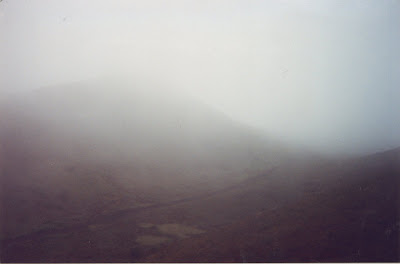I just have a few minutes to freshen up the blog. Therefore, I will quickly post two photos. I once had something to say about these photos, and that is why I kept them and kept thinking about them. Today, they inspire reflection in my self more than anything; I will let you draw your own meaning from them, if any.
In 1995, while in the Marine Corps, my battalion traveled to northern Honshu, Japan, to train with a Japanese unit. We lived in tents for a month training our brains out and freezing our --- off. We were based out of Hawaii, and coming from Okinawa. We were accustomed to tropics. Here, in northern Japan, we had snow. It was miserable and edifying simultaneously. Perhaps the most succinct way of describing an experience like this would be to say, "It was memorable."
We were told that we would be at the base of Mt. Iwate. When we got to base camp, all we saw was snow and fog. Our hosts would point to the north and assure us that there was a huge mountain in that direction, but all we saw was:

When you are cold, tired, and drinking sake every night, you may be like us and tend to doubt the existence of a mountain. We wondered if this was a practical joke, or part of a conspiracy. After several days, the fog lifted. We were able to see Mt. Iwate:

I took these pictures thinking, at that time, that they made a statement about faith. I was a religious kind of guy back then, and I thought that this demonstrated how you can use reliable documents and the testimony of experienced people to guide your faith even if your observations contradict them.
I find very few reliable documents nowadays. I find even less reliable people, even among those whom I root for. Therefore, if I had a metaphorical document and a metaphorical person insisting that I put my faith in something unseen, I would insist upon waiting until the metaphorical fog lifted. Today, I would rather risk being a doubter or insisting that we walk up the side of the mountain with an altimeter and a GPS.
I am not saying that faith is necessarily bad. Faith has led to some great acts of charity and sacrifice. Faith has led to some horrific atrocities.
It is impossible not to have faith. I have faith that my spouse will be faithful to me when she leaves the house, and that she will not sell the kids and wipe out the checking account. I have faith that the drivers in the oncoming lanes are not going to veer into my lane in a horrible cigarette/makeup/shaving/radio/cellphone incident. I have faith that the food I eat and feed to my family (including the two dogs) is not full of lead, mercury, ammonia, cyanide, anthrax, mad cow disease, or whatever. I have faith that the sun will rise tomorrow.
I have faith in those things because I have to. If I lived in constant fear of traffic and food, I would be a mental case and take my family along with me. There are a lot of stories about spouses, drivers, and food incidents that challenge my faith. Even so, I cling to that faith because I cannot face the alternative: a life without faith in the daily fundamentals would be a life of low quality, low quantity, and plentiful amounts of loneliness and fear.
Which leads me to wonder if that is why other people cling to their faiths even though it appears to me that they are illogical, irrational, and sometimes deluded. Could it be that some people cling to outdated, corrupt, mythological, ignorant, or illogical belief systems not because they really believe that the system is true, but because their subconscious cannot face the alternative: a life without a system of faith?
1 comment:
I arrived at my faith the hard way--after graduate school. My BS detectors were on full alert and still I came to have faith--not just the everyday kind that you describe (traffic, etc.), but the kind that leads a person--first to church and then gradually into the everyday PRACTICE of the principles in the good book. I no longer attend services regularly (In fact, have NOT attended since 9/11), but my faith is still strong as it ever was. I see this as my faith maturing and I see no conflict whatsoever between the lessons I have learned in school and what I have learned from my own reading of scripture. I believe that the person who will ultimately judge me will approve, even of my doubts.
Post a Comment